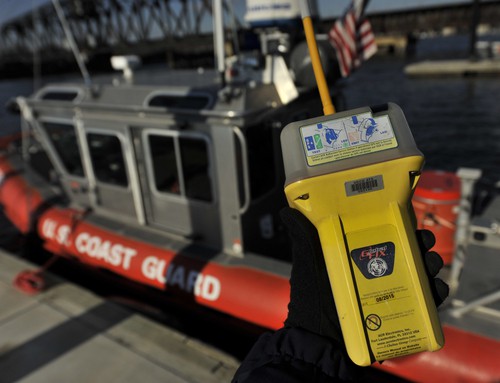In 2018, The Coast Guard responded to a frustratingly-high 700 false alert calls from emergency beacons on boats. Now, USCG is urging anyone with one of these devices to make sure it’s properly registered.
Coast Guard photo: PA3 Robert BrazzellAn emergency position indicating radio beacon (EPIRB) transmits a distress signal to a group of satellites, which relay the information to the Coast Guard and other emergency responders.
Owners of commercial fishing vessels, uninspected passenger vessels that carry six or more people, and uninspected commercial vessels are legally required to carry an EPIRB, but the Coast Guard also says every boater who travels offshore or on long voyages should have one.
Everyone with an EPIRB is required by federal law to register it with NOAA, and to keep the registration information current. If an unregistered beacon activates, the FCC can prosecute the owner based on evidence provided by the Coast Guard, and will issue warning letters or notices of apparent liability for fines up to $10,000.
But despite those consequences, hundreds of people still haven’t bothered to register their beacon or update its contact information. In 2018, USCG was only able to contact 163 of the boat owners responsible for more than 700 false alerts, to determine what caused the alerts. The other 530-plus EPIRB owners hadn’t registered or updated their information, or hadn’t disposed of an old beacon properly.
It’s a big deal because it wastes Coast Guard resources, tying up crews that should be responding to actual emergencies. When Coast Guard watchstanders receive an EPIRB alert and cannot trace it to the owner due to missing or outdated registration information, they must launch aircraft and boat crews to search the area for signs of distress.
“We handle EPIRB alerts with a bias for action,” said Lt. Daniel Dunn, a command duty officer in the Fifth Coast Guard District’s command center. “We have to treat them as actual distress calls until we can prove otherwise.”
It costs approximately $15,000 per hour to fly an HC-130 Hercules airplane, $10,000 per hour to fly an MH-60 Jayhawk helicopter, and $5,000 per hour to operate a Coast Guard small boat, according to the agency.
“If people used this system appropriately, it would take a lot of the guesswork out of search and rescue,” said Dunn. “Unregistered EPIRBs result in lost time, money, and the misuse of resources that could be used to save someone’s life.”
To register your beacon with NOAA, click here.
-Meg Walburn Viviano




